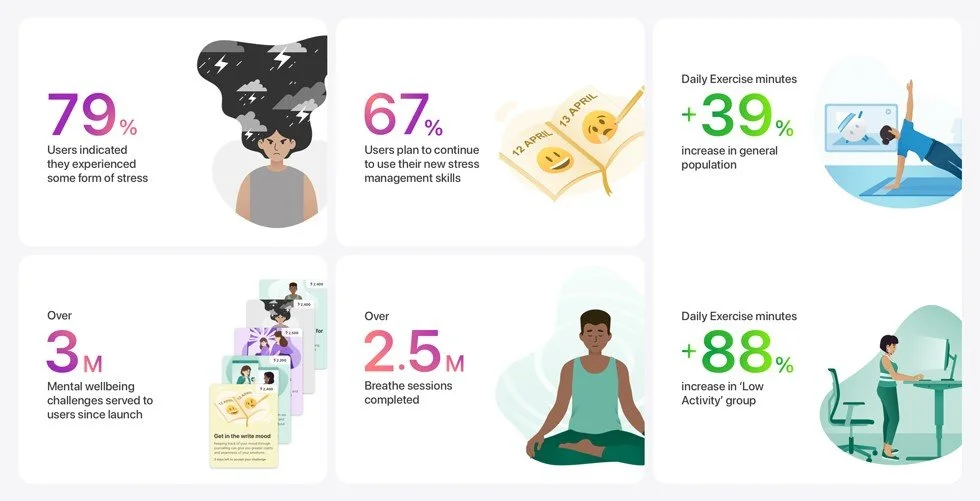#CodingLabParenting: Encouraging Positive Mental Health in Our Future Leaders in Technology
“Good mental health is absolutely fundamental to overall health and well-being”
Mental health care sketch diagram. (Image credits: Freepik/rawpixel.com)
The importance of this situation has been recognized by Minster Ong Ye Kung, who stated that “The youth of today face starkly different mental health challenges compared with those before them“. He illustrates this by drawing attention to how new forms of challenges can arise through social media and the wider internet, which could be too much for a young child to handle, before asserting that “There has to be a whole new literacy other than numeracy and language literacy… and that is digital literacy.”
As a coding school that has seen many students pass through our doors, we know that technology has a huge role in the lives of children and teenagers. While we want to nurture future leaders in technology, we want to ensure the well-being of our students as well. To address mental health, we have compiled several solutions to protect the mental health of you and your children by leveraging technology to its full potential!
1. Using technology to help/ Apps that assist with mental health
Singapore’s MOH Office for Healthcare Transformation (MOHT) has collaborated with Ministry of Social and Family Development, the National Council of Social Service, and the Institute of Mental Health to create a online portal where one can seek mental health support from the safety and security of their houses. The portal features a section exclusively for youths to understand their emotions by answering a series of questions, and then referring them to additional resources for support if required.
A powerful way to regain control of our mental health can be through meditation. A post on HealthHub cites how “Research from 163 different studies suggested that mindfulness-meditation practice had an overall positive effect on improving anxiety and stress management”.
Headspace is a highly-rated app that claims to be the world’s most accessible, comprehensive provider of mental health and well-being care, and even has its own Netflix series! I signed up for the free trial to check out its functions and was pretty surprised to find out that it made a positive impact on me within a few weeks. The simple and intuitive platform guides you along the various exercises and measures you can take to improve and take control of your mental health.
LumiHealth Infographic for mental wellness
For owners of the Apple Watch, check out the LumiHealth app, a “first-of-its-kind health programme designed by Singapore, in partnership with Apple, to help Singaporeans lead healthier lives“. The app features a series of “wellness challenges” that users can take part in to improve both their physical and mental hell and also earn rewards by doing so.
2. Taking breaks from apps
Delete social media apps, or even temporarily disable your social media accounts if needed. Your mental health is the priority!
In today’s world, technology has made it very easy for us to be inter-connected with one another. However, this ease of access can definitely affect our mental health as we are constantly bombarded with information and requests from various applications.
An Ophthalmologist (Eye Doctor) at the Mount Elizabeth hospital in Singapore cites how “Studies have shown that excessive screen time can lead to obesity problems, poor quality sleep, eye strain, as well as educational and behavioural problems“. As such, it is important for us to take breaks from the use of technology. At Coding Lab, mandatory 5 min breaks are imposed during our classes where students get to play, rest and engage in other activities that do not require the use of a digital screen.
Delete social media apps, or even temporarily disable your social media accounts if needed. Your mental health is the priority!
Users on Instagram and Facebook can also choose to temporarily disable their account to take a break, where they will not receive any notifications until the next time they log in. Using the “Don’t Disturb” function on our phones may also be a great way to impose breaks on ourselves to take a break from the world.
3. Talking to people around you for assistance
As previously discussed, one of the ways that mental health issues arise are when one is increasingly isolated. With the use of technology, we can always check in with our loved ones through simple dropping them a text or a phone call to remind them that they are not truly alone. Furthermore, should children not feel comfortable opening up to their parents about certain issues, there are also online mental health therapy resources that one could make use of, such as how We Care Community Services “swopped in-person counselling sessions for video calls on Zoom and Doxy.me“.
The Straits Times has also complied a list of resources that one could make use of should they require mental health services:
Mental Well-Being
Counselling
Online Resources
Institute of Mental Health’s Mental Health Helpline
– 6389-2222 (24 hours)
Samaritans of Singapore
– 1800-221-4444 (24 hours) / 1-767 (24 hours)
Singapore Association for Mental Health
– 1800-283-7019
Silver Ribbon
– 6386-1928
– 1800-274-4788
Community Health Assessment Team
– 6493-6500/ 6493-6501
TOUCHline (Counselling)
– 1800-377-2252
TOUCH Care Line (for seniors, caregivers)
– 6804-6555
Care Corner Counselling Centre:
– 1800-353-5800
We are all different and we are happy to see our students no matter whether they be quiet, vocal, etc. We all have ups and downs in our life, and not all our sufferings are physical. There’s nothing wrong with seeking help when we are suffering mentally, and we hope these resources are helpful for anyone who would like a detox from the burdens in their lives.
(Written by Lech, edited by Thinzar)




